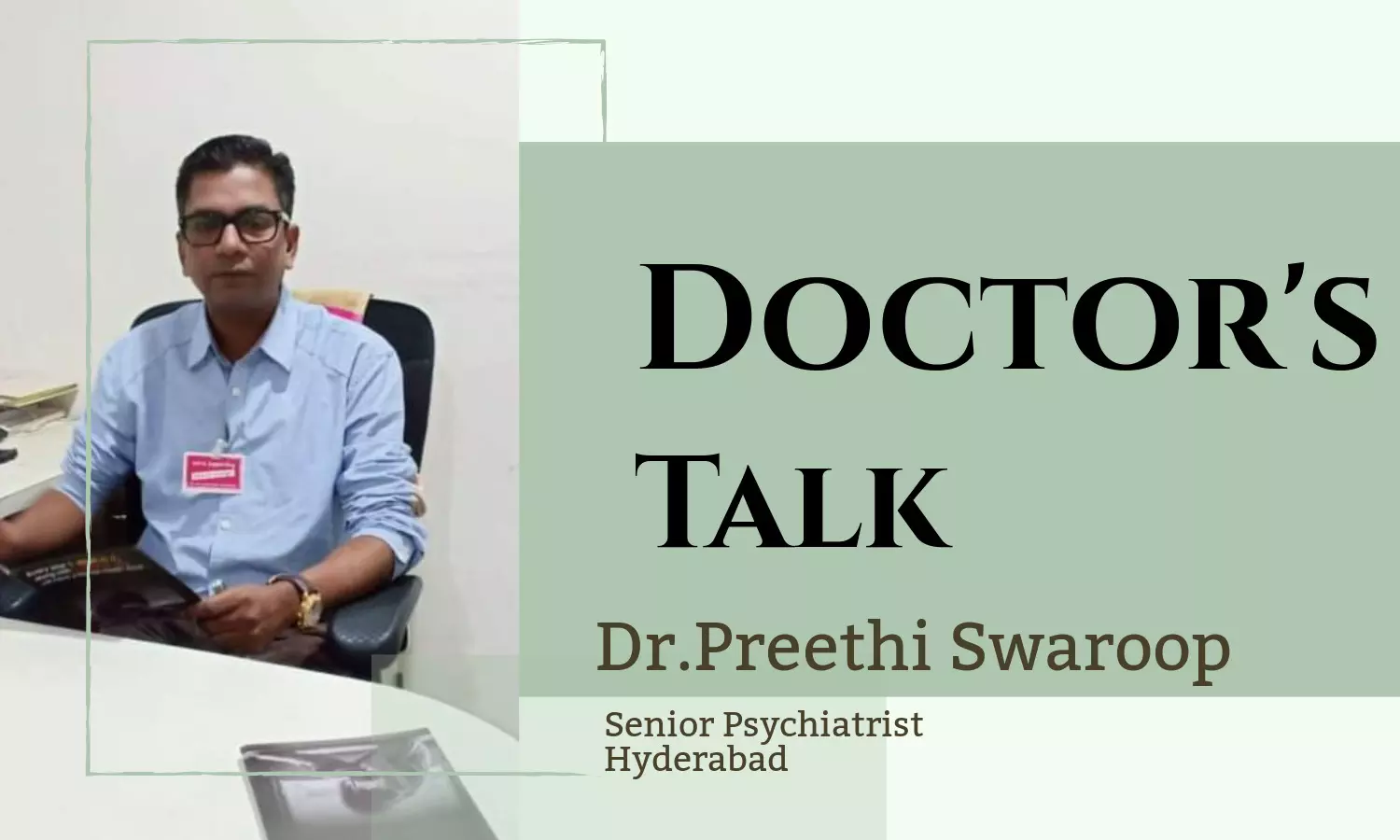Hyd Psychiatrist Dr Preethi Swaroop: Mental illness shifts from psychotic to neurotic disorders
In 1999, there were only five seats in Osmania Medical College for psychiatry. Dr. Swaroop opted for Hyderabad to study psychiatry as he was not willing to relocate to Tirupathi where he had also got a seat.
By Kaniza Garari
Hyderabad: Treating mental illness was as stigmatized as the disease itself. For Dr. Preethi Swaroop, psychiatry was a chance selection as he was pursuing a dream to work in the United Kingdom. During that time, psychiatric knowledge was an important aspect of medical service in the UK. After completing his education, he realised that psychiatry was to have a huge demand in India.
Slow and steady growth in psychiatry
In 1999, there were only five seats in Osmania Medical College for psychiatry. Dr. Swaroop opted for Hyderabad to study psychiatry as he was not willing to relocate to Tirupathi where he had also got a seat.
"In OGH, for the first time, all five seats were filled. Professors were very happy and we learned with the best teachers—Prof. M.A.M Khan and Prof. Raghu Ram Reddy." The patient training was at the Indian Institute of Mental Health, Erragadda.
During that time, patients with mental health problems suffered from bipolar disorders, mania, schizophrenia, and phobia. After graduating from OMC, he joined MediCiti Institute of Medical Sciences to teach psychiatry. There was resistance but later, the Medical Council of India asked medical colleges to include psychiatry as a subject. Apart from government colleges, private colleges also had to teach the course.
With more professors and students in psychiatry, the Hyderabad Psychiatry Society was formed and they conducted camps in different parts of the city.
Dr. Swaroop says, "From the private medical college, we set up a camp at Kowkur Dargah. It was a non-controversial statement where we said 'dawa bhi aur dua bhi'. These patients who were chained and tied, who screamed, and shouted were diagnosed and treated by us. Most of them suffered from mania, schizophrenia, and bipolar disorders. I still have a patient who comes every few months for his medications who visited the dargah. He suffers from schizophrenia. He is a family man now and lives in Kamareddy district."
Camps are still held around the city to identify and treat patients who are mostly not brought to the clinics as they believe there is a supernatural power dominating them.
From psychotic to neurotic disorders
Globalisation, the advent of the software industry, and the opening up of the economy brought mental health disorders like anxiety, depression, obsessive-compulsive disorder, social phobia, panic, anti-social personality disorder, post-traumatic stress disorder, and others to the fore. There was a shift in the mental health scene from psychotic to neurotic disorders. These were induced by changes in society, the structure of the family, and also interpersonal relationships between partners, family members, and cultures of offices.
Pandemic broke the stigma
Before the pandemic, consultation for depression and other disorders was stigmatized. Dr. Swaroop says, "If stigma was 100% before the pandemic, it is now 40%. People are open and seeking help. This is because during the pandemic, panic and anxiety attacks increased by leaps and bounds. The trauma has been social, economic, and personal. People needed help and they came out and asked for it. There are people who want a solution to their problems. But at the same time, substance abuse has increased tremendously. All the major metro cities have de-addiction centers as this is an increasing burden in society."
Psychiatry now has a wealth of knowledge in terms of disease patterns and also research backed with treatment modules. Dr. Swaroop says, "We now have first, second, and third generation drugs to treat patients. There is therapy and medication which goes hand-in-hand for treatments."
Apart from Hyderabad, there are psychiatric societies in Karimnagar, Warangal, and Khamman showing expansion that has taken place in smaller cities too.
In his 21 years on the job, Dr. Swaroop has donned the position of vice-president and president of Hyderabad Psychiatric Society and also mentored many students.
He is closely associated with the Indian Institute of Mental Health and also fought for the objectionable clauses that were a part of the Mental Health Bill. "There is a lot of work done by the Indian Psychiatric Society and the National Institute of Mental Health and Neurosciences in creating awareness about mental health in India. The road ahead for young psychiatrists is challenging as many pass out each year due to which there is a lot of competition," he says.
Dr. Swaroop adds, "Mental health disorders are both genetic and social in nature. There are countless out there who need help but cannot afford it. For this reason, private practice is slightly tricky as it is available to only those who can afford it."
It's family time outside the clinic
"I love going on holidays, both national and international, with my family. I keep patients and their disorders at the clinic only and do not take any of their burden home. For me, family time is important," says Dr. Swaroop.